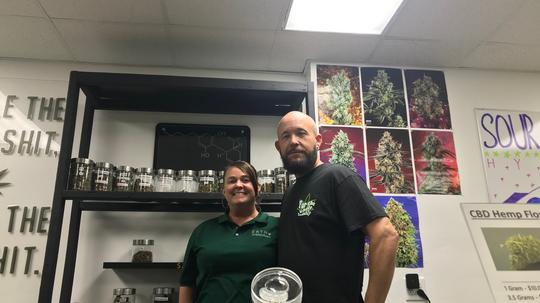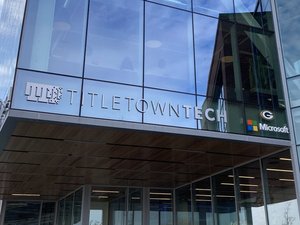
At Erth Dispensary in Milwaukee’s eclectic Bay View neighborhood, serving up CBD cookies to customers is business as usual. The CBD brick-and-mortar retail store at the corner of Clement and Oklahoma avenues opened roughly one year ago and so far, business has been pretty good, says Jason Ranic, who runs the store with his partner Jennifer Kawczynski.
“It’s definitely been a profitable venture,” says Ranic. “We’re looking at expanding to a second store in the next few months.”
On this weeknight, the pair listen intently as a steady stream of walk-ins describe their maladies. With infectious enthusiasm and impressive encyclopedic knowledge of all-things-hemp, the co-owners ramble off grass strains and their accompanying medicinal properties while fishing CBD products from the store shelves.
Erth Dispensary is reminiscent of an old general store. The retailer offers a small array of energy drinks, shakes, and foodstuffs; clothing and confectionaries; tinctures, topical ointments, and essential oils; candles; and bath and beauty products — all infused with CBD, and much of it made in-house under the partners’ private label, ErthScentials CBD.
Behind the counter, “Budtenders” point to nearly a dozen glass jars filled with plump hemp buds with names like Green Luna, Electra and Mango Haze.
Ranic provides a laundry list of CBD’s healing benefits — showcasing products that proclaim to relieve pain and stress, quell insomnia or reduce anxiety — though legally, he “can’t make any claims,” and “none of it gets you high,” he says.
“Most of our clientele are elderly who come in search of pain relief,” Ranic says. “A lot of people think it’s young people [visiting the store]. Our most common customer is new to this. People are scared to come out here or are nervous, so we try to help them identify their troubles or ailments.”
“We’re kind of like a Walgreens,” he jokes.
Tracking Wisconsin’s Hemp Boom
Erth Dispensary is just one of hundreds of CBD retailers and vendors popping up across Wisconsin, seemingly overnight. Countless other businesses — from bakeries to boutiques to bookstores — have added CBD-infused goods to their product lineups, hoping to lure customers in search of its hemp-derived benefits.
Wisconsin’s businesses are after a piece of the CBD pie. Nationally, the hemp-derived CBD market is expected to swell to more than $23 billion in revenue by 2023, with CBD processing accounting for roughly 87 percent of hemp grown in the U.S., according to research by the Brightfield Group.

Driven by the signing of The Agriculture Improvement Act of 2018, more casually known as the 2018 Farm Bill, Wisconsin is among 47 states that have expanded commercial hemp cultivation programs with various rules and regulations. (The USDA recently released new interim rules for domestic hemp production.)
Wisconsin’s agricultural industry is far from alone in getting a boost from hemp, but industry insiders say the nation’s hemp supply chain remains on shaky ground.
That hasn’t stopped the country’s retailers — or farmers — from planting roots in the industry. Brightfield Group estimates more than 285,000 acres of hemp will be planted in 2019, up from 78,000 in 2018, most of which is slated for CBD processing, making hemp the fastest-growing cash crop in the nation.
Here in the Dairy State, farmers planted about 5,000 acres of commercial hemp in 2019, a number nearly 15 times more than the number of hemp growers with annual registrations in 2018, according to information provided by the Wisconsin Department of Agriculture, Trade and Consumer Protection (DATCP).
It’s not hard to see why Wisconsin’s farmers are getting their feet wet, says Rob Richard, president at Wisconsin Hemp Alliance, a hemp advocacy and education group.
“The last five years have been absolutely horrendous for the farming economy, so [farmers] are looking for an alternative,” says Richard, adding that changing consumer demands and tariffs imposed by the Trump Administration have added to the impact. “When you are a farmer, you are always looking for an extra tool in the toolbox. Anything to make a profit.”
According to Brightfield, growing hemp for CBD could potentially lead to revenues of over $40,000 per acre for farmers. That’s compared to less than $1,000 per acre for corn.
Despite the hemp boom, the murkiness of CBD’s legal stance has put some in Wisconsin’s private sector — and many would-be-consumers — on pause. For one, the FDA has not approved CBD as an ingredient in human or animal food or medicine, said Donna Gilson, a former spokesperson for DATCP.
"Hemp is not Cheech and Chong."
And while growing industrial hemp is now legal, CBD products must maintain a .3 percent THC content rate to remain outside the reins of a controlled substance in accordance with federal law. Medical marijuana, which extends to levels above .3% and produces a psychoactive effect, remains illegal in Wisconsin.
Testing the Waters
It seems Wisconsin’s CBD industry is still getting its sea legs. In Sheboygan, at least three new CBD stores have opened downtown over the past year, but it’s been difficult to gauge whether the market is in disequilibrium, says Ray York, an entrepreneurship specialist with the Sheboygan County Economic Development Corporation.
With stores rapidly taking over strip malls and other building vacancies, real estate developers welcome the rush of new stores, but saturation remains a concern among York, Ranic, and others interviewed for this story.
Ranic says while his store continues to be profitable, he has noticed a slight dip in revenue as more than a dozen CBD-focused retailers have opened doors in his area over the past year.
“Once the laws tighten up, I think they will fizzle out a bit,” Ranic says. “I think the good companies, with a lot of product, that work with farmers who have the highest standards, will prevail.”
For now, the City of Sheboygan is treating CBD retailers like any other business that opens up shop in town.
“It’s such a new business,” York says. “Law enforcement wasn’t sure what to think of it. Local investors, business startups, real estate — they are all looking into the hemp and CBD industry, and wondering if it is the right spot for their money. Is this a trend that’s going away, or will this be sustainable? We just don’t know the complete demand for this product, yet.”
“I kind of look at it like a diet trend,” he adds.
Part of the problem, York says, is that the state’s consumers and business professionals are unsure of hemp and CBD as an alternative commodity.
“It’s a mixed bag even to this day,” says York. “There is a lot of confusion. [People] think it has to do with marijuana — they don’t quite understand what the product is about.”
Clearing the misconception around hemp is Richard’s mission. While his work with the Wisconsin Hemp Alliance may be voluntary, he remains passionate about “doing everything we can to promote hemp,” in Wisconsin. In addition to lobbying for the legalisation of hemp, the group previously hosted a series of “Hemp is Fine” events to help educate farmers on the plant’s economic potential.
“One of my first slides is: ‘Hemp is not Cheech and Chong,’” he said. “Once I get them past this image,” they tend to get on board. “When the public gains a better awareness about what hemp can be used for, and if we’re having an honest discussion about sustainability, [the farmers] need to be involved. They need to bring pressure, and create a buyer. Hemp is one way we can actually make that happen.”
“We want to help Wisconsin move forward, so that [hemp] is farmed here, processed here, it’s sold here, and it all goes back to funnel into Wisconsin’s markets.”
In addition to CBD products, Richard would like to see Wisconsin expand its hemp portfolio to include its uses as a plastic substitute, as “hempcrete” — a biocomposite similar to concrete — and livestock feed. There’s plenty of room for innovation, he adds.
“We have a market that’s underdeveloped. The supply chain is still being developed,” said Richard. “People aren’t going to grow too much because the market is so volatile. If you’re a grower, you may have a buyer, you may have a retailer, but there is a gap. There has to be a huge shift from how consumers buy products.”
Investors See CBD as ‘High-Risk’
Phillip Scott is one farmer who took on the risk. After realizing that corporations were coming in from out of state to seize on the region’s growing CBD industry, he applied for his grower’s license.
Today, Scott operates 182 acres of hemp fields across the state and serves as president of the Wisconsin Hemp Farmers and Manufacturers Association. The group works to bring farmers and manufacturers together to create a healthy hemp and CBD industry in the state.
“There are VC groups that want to come in and establish a foothold, and it drives economic growth, but it doesn’t really stay in the state,” Scott says. “We want to help Wisconsin move forward, so that [hemp] is farmed here, processed here, it’s sold here, and it all goes back to funnel into Wisconsin’s markets.”
Front Range Biosciences is one out-of-state company hoping to cash in on Wisconsin’s hemp crops.
This fall, the Denver-based agricultural biotech company completed an $8.5 million insider funding round, raised in part to expand its greenhouse operations in Wisconsin and other markets. The company provides farmers with feminized hemp seed and plants to create commercially viable crop yields.
CEO and co-founder Jonathan Vaught says the advancement of cannabis legalization and the “flourishing marketplace” in Wisconsin provided a ripe business opportunity for the company.
“Hemp is on its way toward becoming the next high-value crop,” Vaught said by email. “With ample land and experienced farmers, Wisconsin can accelerate [our] ability to supply market demand, and deliver hemp plants that perform in the region.”
The biggest challenge in Wisconsin for Front Range Sciences is educating farmers on growing hemp in their associated regions, as well as the lack of education around what hemp is, he added.
Scott says many farmers are hesitant to pull capital to invest the time, resources, and equipment to launch a hemp cultivation operation. Securing a bank loan in a high-risk industry proves even more futile, a point Ranic reiterated on the retail side.
Scott attributes investor reluctance to a lack of guidance surrounding CBD businesses in the state. Without official regulations or standards in place to test CBD-infused products for potency, for example, some in the hemp business fear a few bad apples could spoil the momentum for everyone involved.
“There are farmers who want to get their hands dirty and grow it themselves,” Scott explains. “We’ve had big groups of capital ventures who come and have big conversations, but do you go big or go small? That is the unknown. There are investors out there, but they’re still hesitant to pull the trigger.”
Still, Scott, like so many others, are placing their bets on CBD. The DATCP reported that as of November, the agency had received 209 grower license applications for the 2020 hemp growing season.
“We want to generate capital,” Scott says. “Everyone wants a chance in this new industry, but it’s untapped at the end of the day. There’s still a potential market that could go through the roof because so many people haven’t tried it yet.”








